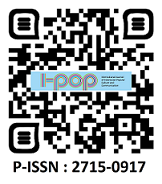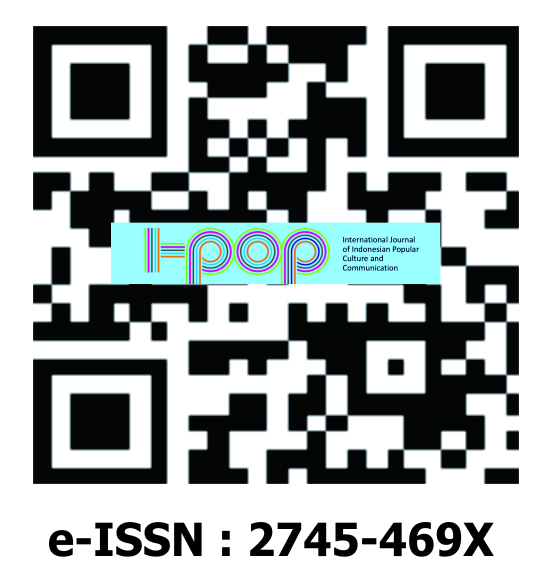The Commoditized Self
Interpersonal Communication in Tinder Online Dating Apps
DOI:
https://doi.org/10.36782/i-pop.v1i2.68Keywords:
interpersonal communication, self-presentation, self-disclosure, digital culture, media psychologyAbstract
Online dating apps have changed the way people build interpersonal communication, particularly in the way they present and disclose themselves online in order to search for a relationship. The characteristic of online dating apps has urged users to build a rather liquid relationship; hence the transformation of intimacy and user’s view of romance, sex, and relationship. In the frame of computer-mediated communication and social informatics, socio-cultural context plays a significant role in shaping the self-presentation and self-disclosure performed by people, in the relation to the dating culture in Indonesia. In the case of Indonesia, this phenomenon is considered unique since the socio-cultural context is rather seeing the ‘liquidity’ in modern romance as banality and condemning the practice as immoral. This research aims to analyze the Indonesian socio-cultural context in shaping people’s self-presentation and self-disclosure in interpersonal communication through online dating apps, particularly Tinder. This research is conducted by a new ethnography method, involving 20 informants who are Indonesian youth active users of online dating apps. The key findings in this research include the contestation between self-agency and self-commodification in the practice of using online dating apps, as well as the shaping of contemporary dating culture among Indonesian youth. Apparently, the contemporary dating culture in Indonesia, also constructed heavily by online dating apps, allows ones to gain sexual revolution in the process of commodifying themselves.
Downloads
References
Allmer, T. (2015). Critical theory and social media: between emancipation and commodification. Routledge.
Antheunis, M. L., Schouten, A. P., & Walther, J. B. (2019). The hyperpersonal effect in online dating: effects of text-based CMC vs. video conferencing before meeting face-to-face. Media Psychology 23(6), 825-839. [CrossRef]
Arymami, D. (2018). Redefinisi Keintiman dalam Masyarakat Skizofrenia. In Budiawan (Ed.), Dari Design Kebaya Hingga Masyarakat Raja Ampat (pp. 3–23). Penerbit Ombak.
Bruhn, J. (2016). The intermediality of narrative literature: medialities matter. Palgrave Macmillan.
Castells, M. (2013). Communication power. OUP Oxford.
Castells, M., Fernandez-Ardevol, M., Qiu, J. L., & Sey, A. (2009). Mobile communication and society: A global perspective. MIT Press.
Clemens, C., Atkin, D., & Krishnan, A. (2015). The influence of biological and personality traits on gratifications obtained through online dating websites. Computers in Human Behavior, 49, 120–129. [CrossRef]
Edgar, A., & Sedgwick, P. (2008). Cultural Theory: The Key Concepts. Routledge.
Ferdiana, C., Susanto, E. H., & Aulia, S. (2020). Penggunaan Media Sosial Tinder dan Fenomena Pergaulan Bebas di Indonesia. Koneksi, 4(1), 112–118. [CrossRef]
Finkel, E. J., Eastwick, P. W., Karney, B. R., Reis, H. T., & Sprecher, S. (2012). Online dating: A critical analysis from the perspective of psychological science. Psychological Science in the Public Interest, 13(1), 3–66. [CrossRef]
Giddens, A. (2013). The transformation of intimacy: Sexuality, love and eroticism in modern societies. John Wiley & Sons.
Herdianti, A. H. (2018). Pencarian jodoh melalui aplikasi tinder di era digital. Universitas Airlangga.
Homnack, A. (2015). Online dating technology effects on interpersonal relationships. Advanced Writing: Pop Culture Intersections, 4. [GoogleScholar]
Kurnia, L. (2019). Transformasi komunikasi interpersonal pada pasangan kencan online: Studi Kasus pada Pasangan Pengguna Aplikasi Tinder. Universitas Pendidikan Indonesia.
Lamb, R., & Kling, R. (2003). Reconceptualizing users as social actors in information systems research. MIS Quarterly, 27(2), 197–235. [CrossRef]
Lawado, M. R., & Sukardani, P. S. (2020). Komunikasi Antarpersonal pada Pasangan Berbasis Aplikasi Kencan Online (Studi Deskriptif Mahasiswa Negeri Surabaya Pengguna Aplikasi Tinder). Commercium, 2(2). 113-118. [GoogleScholar]
Mellania, C., & Tjahjawulan, I. (2020). Pencarian Jodoh Daring Masyarakat Urban Indonesia: Studi Kasus Aplikasi Tinder dan OkCupid. Jurnal Senirupa Warna, 8(1), 19-37. [CrossRef]
Miller, M. (2015). 500 Dates: Dispatches from the Front Lines of the Online Dating Wars. Skyhorse Publishing.
Orgad, S. (2007). The Internet as a moral space: the legacy of Roger Livingstone. New Media & Society, 9(1), 33–41. [CrossRef]
Purwaningtyas, M. P. F. (2019). Privacy and Social Media: Defining Privacy in the Usage of Path. KnE Social Sciences, 217–235. [CrossRef]
Purwaningtyas, M. P. F. (2020). Searching for Relationship in Digital Era: Online Dating Apps and Mediated Interpersonal Human Communication. Symposium on Social Science 2020: Rethinking the Social World in the 21st Century, 482–489.
Rapport, N., & Overing, J. (2000). Social and Cultural Anthropology: The Key Concepts. Routledge.
Rochadiat, A. M. P., Tong, S. T., & Novak, J. M. (2018). Online dating and courtship among Muslim American women: Negotiating technology, religious identity, and culture. New Media & Society, 20(4), 1618–1639. [CrossRef]
Saukko, P. (2003). Doing research in cultural studies: An introduction to classical and new methodological approaches. SAGE Publications.
Schwartz, P., & Velotta, N. (2018). Online Dating: Changing Intimacy One Swipe at a Time? In J. Van Hook, S. McHale, & V. King (Eds.), Families and Technology: National Symposium on Family Issues, Vol. 9. Springer.
Scott, J. (2006). Sociology: The Key Concepts. Routledge.
Setyowati, D. (2020, May 20). Aplikasi Kencan Panen Pengguna dan Transaksi selama Pandemi Corona. Katadata.Co. [OnlineMedia]
Van Dijck, J. (2013). The culture of connectivity: A critical history of social media. Oxford University Press.
Walther, J. B. (2008). Personal communication by CMC. The International Encyclopedia of Communication. [CrossRef]
Walther, J. B. (2011). Theories of CMC and interpersonal relations. The Handbook of Interpersonal Communication, 443–479. [GoogleScholar]
Weigel, M. (2016). Labor of Love: The Invention of Dating. Farrar, Straus and Giroux.
Wu, P., & Chiou, W. (2009). More options lead to more searching and worse choices in finding partners for romantic relationships online: An experimental study. Cyberpsychology & Behavior, 12(3), 315–318. [CrossRef]









